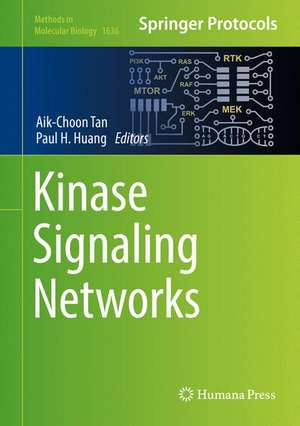Kinase Signaling Networks: Methods in Molecular Biology, cartea 1636
Editat de Aik-Choon Tan, Paul H. Huangen Limba Engleză Hardback – 21 iul 2017
Authoritative and practical, Kinase Signaling Networks aims to provide scientists with the tools necessary to overcome the technological bottlenecks that limit our ability to gain a deeper mechanistic understanding of kinase biology.
| Toate formatele și edițiile | Preț | Express |
|---|---|---|
| Paperback (1) | 954.98 lei 38-44 zile | |
| Springer – 28 iul 2018 | 954.98 lei 38-44 zile | |
| Hardback (1) | 1243.15 lei 6-8 săpt. | |
| Springer – 21 iul 2017 | 1243.15 lei 6-8 săpt. |
Din seria Methods in Molecular Biology
- 9%
 Preț: 791.59 lei
Preț: 791.59 lei - 23%
 Preț: 598.56 lei
Preț: 598.56 lei - 20%
 Preț: 882.95 lei
Preț: 882.95 lei -
 Preț: 252.04 lei
Preț: 252.04 lei - 5%
 Preț: 802.69 lei
Preț: 802.69 lei - 5%
 Preț: 729.61 lei
Preț: 729.61 lei - 5%
 Preț: 731.43 lei
Preț: 731.43 lei - 5%
 Preț: 741.30 lei
Preț: 741.30 lei - 5%
 Preț: 747.16 lei
Preț: 747.16 lei - 15%
 Preț: 663.45 lei
Preț: 663.45 lei - 18%
 Preț: 1025.34 lei
Preț: 1025.34 lei - 5%
 Preț: 734.57 lei
Preț: 734.57 lei - 18%
 Preț: 914.20 lei
Preț: 914.20 lei - 15%
 Preț: 664.61 lei
Preț: 664.61 lei - 15%
 Preț: 654.12 lei
Preț: 654.12 lei - 18%
 Preț: 1414.74 lei
Preț: 1414.74 lei - 5%
 Preț: 742.60 lei
Preț: 742.60 lei - 20%
 Preț: 821.63 lei
Preț: 821.63 lei - 18%
 Preț: 972.30 lei
Preț: 972.30 lei - 15%
 Preț: 660.49 lei
Preț: 660.49 lei - 5%
 Preț: 738.41 lei
Preț: 738.41 lei - 18%
 Preț: 984.92 lei
Preț: 984.92 lei - 5%
 Preț: 733.29 lei
Preț: 733.29 lei -
 Preț: 392.58 lei
Preț: 392.58 lei - 5%
 Preț: 746.26 lei
Preț: 746.26 lei - 18%
 Preț: 962.66 lei
Preț: 962.66 lei - 23%
 Preț: 860.21 lei
Preț: 860.21 lei - 15%
 Preț: 652.64 lei
Preț: 652.64 lei - 5%
 Preț: 1055.50 lei
Preț: 1055.50 lei - 23%
 Preț: 883.85 lei
Preț: 883.85 lei - 19%
 Preț: 491.88 lei
Preț: 491.88 lei - 5%
 Preț: 1038.84 lei
Preț: 1038.84 lei - 5%
 Preț: 524.15 lei
Preț: 524.15 lei - 18%
 Preț: 2122.34 lei
Preț: 2122.34 lei - 5%
 Preț: 1299.23 lei
Preț: 1299.23 lei - 5%
 Preț: 1339.10 lei
Preț: 1339.10 lei - 18%
 Preț: 1390.26 lei
Preț: 1390.26 lei - 18%
 Preț: 1395.63 lei
Preț: 1395.63 lei - 18%
 Preț: 1129.65 lei
Preț: 1129.65 lei - 18%
 Preț: 1408.26 lei
Preț: 1408.26 lei - 18%
 Preț: 1124.92 lei
Preț: 1124.92 lei - 18%
 Preț: 966.27 lei
Preț: 966.27 lei - 5%
 Preț: 1299.99 lei
Preț: 1299.99 lei - 5%
 Preț: 1108.51 lei
Preț: 1108.51 lei - 5%
 Preț: 983.72 lei
Preț: 983.72 lei - 5%
 Preț: 728.16 lei
Preț: 728.16 lei - 18%
 Preț: 1118.62 lei
Preț: 1118.62 lei - 18%
 Preț: 955.25 lei
Preț: 955.25 lei - 5%
 Preț: 1035.60 lei
Preț: 1035.60 lei - 18%
 Preț: 1400.35 lei
Preț: 1400.35 lei
Preț: 1243.15 lei
Preț vechi: 1516.03 lei
-18% Nou
Puncte Express: 1865
Preț estimativ în valută:
237.91€ • 245.77$ • 197.100£
237.91€ • 245.77$ • 197.100£
Carte tipărită la comandă
Livrare economică 25 martie-08 aprilie
Preluare comenzi: 021 569.72.76
Specificații
ISBN-13: 9781493971527
ISBN-10: 1493971522
Pagini: 517
Ilustrații: XVII, 537 p. 112 illus., 74 illus. in color.
Dimensiuni: 178 x 254 mm
Greutate: 1.18 kg
Ediția:1st ed. 2017
Editura: Springer
Colecția Humana
Seria Methods in Molecular Biology
Locul publicării:New York, NY, United States
ISBN-10: 1493971522
Pagini: 517
Ilustrații: XVII, 537 p. 112 illus., 74 illus. in color.
Dimensiuni: 178 x 254 mm
Greutate: 1.18 kg
Ediția:1st ed. 2017
Editura: Springer
Colecția Humana
Seria Methods in Molecular Biology
Locul publicării:New York, NY, United States
Cuprins
Optogenetic Control of Ras/Erk Signaling Using the Phy–PIF System.- Dissecting Kinase Effector Signaling Using the RapRTAP Methodology.- Single-Cell Imaging of ERK Signaling Using Fluorescent Biosensors.- Quantification of Cell Signaling Networks Using Kinase Activity Chemosensors.- Expression of Recombinant Phosphoproteins for Signal Transduction Studies.- Allosteric Modulation of Src-Family Kinases with ATP-Competitive Inhibitors.- Characterization of Ligand Binding to Pseudokinases Using a Thermal Shift Assay.- Proteomic Profiling of Protein Kinase Inhibitor Targets by Mass Spectrometry.- Utilizing the Luminex Magnetic Bead-Based Suspension Arrays for Rapid Multiplexed Phosphoprotein Quantification.- High-Content Imaging and RNAi Screens for Investigating Kinase Network Plasticity.- Analysis of Drug Resistance Using Kinome-Wide Functional Screens.- Identification and Validation of Driver Kinases from Next Generation Sequencing Data.- Label-Free Phosphoproteomic Approach for Kinase Signaling Analysis.- Cell-Specific Labeling for Analyzing Bidirectional Signaling by Mass Spectrometry.- Characterization of the Phospho-Adhesome by Mass Spectrometry-Based Proteomics.- Analysis of Phosphotyrosine Signaling Networks in Lung Cancer Cell Lines.- Targeted Analysis of Phosphotyrosine Signaling by Multiple-Reaction-Monitoring Mass Spectrometry.- Phosphoproteomic Analysis of Isolated Mitochondria in Yeast.- A Methodology for Comprehensive Analysis of Toll-Like Receptor Signaling in Macrophages.- Absolute Phosphorylation Stoichiometry Analysis by Motif-Targeting Quantitative Mass Spectrometry.- Identification of Plant Kinase Substrates Based on Kinase Assay-Linked Phosphoproteomics.- Mass Spectrometry Analysis of Spatial Protein Networks by Colocalization Analysis (COLA).- Development of Selected Reaction Monitoring Methods to Systematically Quantify Kinase Abundance and Phosphorylation Stoichiometry in Human Samples.- Analysis of Signaling Networks at the Single Cell Level Using Mass Cytometry.- Magnetic Resonance Spectroscopy (MRS)-Based Methods for Examining Cancer Metabolism in Response to Oncogenic Kinases Drug Treatment.- Deconstructing the Metabolic Networks of Oncogenic Signaling Using Targeted Liquid-Chromatography Tandem Mass Spectrometry (LC-MS/MS).- Modeling of Receptor Tyrosine Kinase Signaling: Computational and Experimental Protocols.- An Interdisciplinary Approach for Designing Kinetic Models of the Ras/MAPK Signaling Pathway.- Databases and Computational Tools for Evolutionary Analysis of Protein Phosphorylation.- Informatics Approaches for Predicting, Understanding, and Testing Cancer Drug Combinations.- Target Inhibition Maps Based on Responses to Kinase Inhibitors.- Partial Least Squares Regression Models for the Analysis of Kinase Signaling.
Textul de pe ultima copertă
This detailed volume describes cutting-edge techniques in three distinct and complementary areas of contemporary kinase biology research. Beginning with a section on synthetic biology, chemical biology, and screening approaches to kinase signaling networks, the book continues with sections on mass spectrometry and metabolic analysis of kinase signaling as well as computational analysis of kinase signaling networks. Written for the highly successful Methods in Molecular Biologyseries, chapters include introductions to their respective topics, lists of the necessary materials and reagents, step-by-step, readily reproducible laboratory protocols, and tips on troubleshooting and avoiding known pitfalls.
Authoritative and practical, Kinase Signaling Networks aims to provide scientists with the tools necessary to overcome the technological bottlenecks that limit our ability to gain a deeper mechanistic understanding of kinase biology.
Caracteristici
Includes cutting-edge techniques for the study of kinase signaling networks Provides step-by-step detail essential for reproducible results Contains key implementation advice from the experts Includes supplementary material: sn.pub/extras Includes supplementary material: sn.pub/extras











